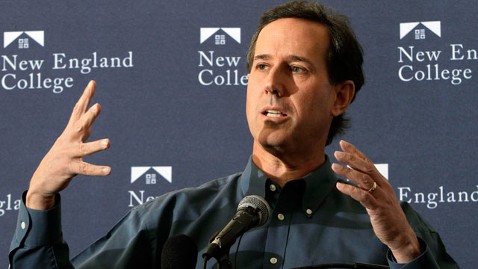Democrats on Santorum's Rise: Whatever

The headlines out of Iowa this week told the story of an underdog ex-senator clawing his way to the top of the GOP field, getting nearly as many votes as Mitt Romney did in the caucus.
But Democrats are largely ignoring Rick Santorum. Instead, they've kept their fire trained on Romney, just as they did as other candidates briefly crested in the eyes of Republican voters.
The strategy is partly an assumption that Romney will be the GOP's nominee, and partly a desire to let Santorum challenge the front-runner in a way that no other candidate has in the race so far, according to strategists.
When Democrats do mention Santorum publicly - rarely - they do so through a prism that reflects Romney's attributes.
A caucus-night statement from Democratic National Committee chairwoman Debbie Wasserman Schultz focused on Romney and said he's "campaigning and adopting policies far to the right" of the other candidates. On a conference call the next day, President Obama's campaign advisers talked mostly of Romney's performance and dismissed Santorum, suggesting that he would meet a fate similar to Newt Gingrich after he enjoyed a brief surge in the polls.
Since then, the DNC's press shop has blasted out nearly three dozen emails casting Romney in a negative light. How many for Santorum? Zero. (And none for any other candidate either.)
"All the calls I've been on - all the action is precisely about Romney," said Peter Fenn, a veteran Democratic strategist.
Even as deeper scrutiny into his past has accompanied Santorum's rise, Democrats have shied away from broadcasting it. After all, if Santorum were to somehow become the nominee, all of that information would still be out there.
"Why attack Santorum?" asked Jamal Simmons, a Democratic strategist. "Santorum is doing what no Republican has really been able to do so far, which is provide Mitt Romney with a real contest with voters."
Democrats are also hoping that Gingrich follows through on his caucus-night suggestion to "tell the truth" about Romney even if it means being negative. Romney could find himself being double-teamed at a pair of debates before New Hampshire's primary on Tuesday - Gingrich has shown that he's a fan of Santorum and will probably be saving most of his criticism for the front-runner.
Republicans say that a contested primary helps the party because it gets attention in the media and excites voters. "Everyone is talking about it, including David Axelrod and the chairwoman of the DNC," Reince Priebus, the chairman of the Republican National Committee, said on Fox News on Thursday.
While Priebus might be right, Democrats are hoping for a drawn-out primary process that leaves Romney stumbling across the finish line just as Obama is done warming up. The situation is similar, but different enough, to the primaries in 2008, when John McCain wrapped up the nomination early while Obama and Hillary Clinton battled each other late into the season.
One key difference is that whereas Obama and Clinton were stepping toward more centrist views to win over white moderates, Romney is competing for conservative votes on the wing of his party, opening him up to taking positions that could make him vulnerable as the nominee.
That's where the other candidates come in, the way Democrats see it this time around.
"Just let Gingrich and Santorum do their thing," Simmons said. "There's no reason to get too involved."